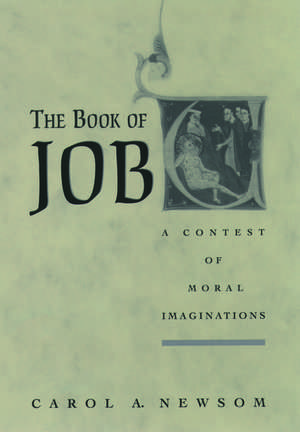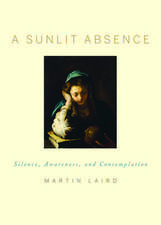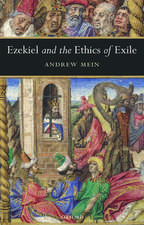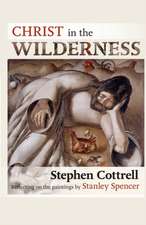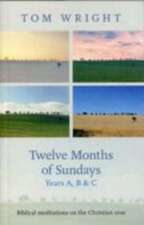The Book of Job: A Contest of Moral Imaginations
Autor Carol A. Newsomen Limba Engleză Hardback – 27 mar 2003
Preț: 672.51 lei
Preț vechi: 951.02 lei
-29% Nou
Puncte Express: 1009
Preț estimativ în valută:
128.68€ • 134.36$ • 106.50£
128.68€ • 134.36$ • 106.50£
Carte tipărită la comandă
Livrare economică 24-31 martie
Preluare comenzi: 021 569.72.76
Specificații
ISBN-13: 9780195150155
ISBN-10: 0195150155
Pagini: 320
Dimensiuni: 234 x 160 x 31 mm
Greutate: 0.58 kg
Editura: Oxford University Press
Colecția OUP USA
Locul publicării:New York, United States
ISBN-10: 0195150155
Pagini: 320
Dimensiuni: 234 x 160 x 31 mm
Greutate: 0.58 kg
Editura: Oxford University Press
Colecția OUP USA
Locul publicării:New York, United States
Recenzii
This book offers an insightful reading of Job and conceptually advances the understanding of modes of expression of Iraelite religious thought.
This approach results in a extraordinary reading of Job, both methodologically and substantively. Newsom does not pretend to resolve all the interpretive cruxes, but to put the conversation on a firm footing, and she succeeds admirably.... readers who engage Job under her guidance will find themselves grappling indirectly with its moral and even its pastoral implications. This is the kind of interpretation that gets to the heart of the matter and makes a real difference--criticism in the best sense of the word.
Carol Newsom's magnificent analysis of the book of Job from the perspective of modern hermeneutics, and propelled by the theme of the moral imagination, is destined to become a classic. Her deft handling of the interpretive tradition, her choice of guides--e.g., Mikhail Bakhtin, Wayne Booth, Emmanuel Levinas, Paul Ricoeur, Martha Nussbaum, Alasdair MacIntyre--and her engagement with the biblical text in all its complexity are a joy to behold.
Carol Newsom's study of Job is an insightful and provocative reading of that most difficult of biblical books. By combining literary-critical and postmodern methodologies, she significantly advances our interpretation of the book of Job, solving many problems that earlier treatments have not. This is a major and substantial contribution, lucid in both argument and style. Future work on Job will have to begin where Newsom leaves off.
Carol Newsom's new book raises the level of discourse on the discourse of the Book of Job to a higher plane. Rarely has such literary sophistication been applied to a Biblical text with such clarity and moment. We are led to read the different parts of Job and the different voices given expression within them in dialogue with each other, without privileging one over the other. Drawing (ever critically) on the work of Bakhtin and several other theorists and critics, Newsom makes a powerful argument for an active reading of Job that is intensely engaged both textually and morally. No serious reader of Job will pass over Newsom's book, and no reader of the book will ever be the same. Readers may well find it, as I did, a milestone in their education. A tour de force and a major contribution to Biblical interpretation.
This approach results in a extraordinary reading of Job, both methodologically and substantively. Newsom does not pretend to resolve all the interpretive cruxes, but to put the conversation on a firm footing, and she succeeds admirably.... readers who engage Job under her guidance will find themselves grappling indirectly with its moral and even its pastoral implications. This is the kind of interpretation that gets to the heart of the matter and makes a real difference--criticism in the best sense of the word.
Carol Newsom's magnificent analysis of the book of Job from the perspective of modern hermeneutics, and propelled by the theme of the moral imagination, is destined to become a classic. Her deft handling of the interpretive tradition, her choice of guides--e.g., Mikhail Bakhtin, Wayne Booth, Emmanuel Levinas, Paul Ricoeur, Martha Nussbaum, Alasdair MacIntyre--and her engagement with the biblical text in all its complexity are a joy to behold.
Carol Newsom's study of Job is an insightful and provocative reading of that most difficult of biblical books. By combining literary-critical and postmodern methodologies, she significantly advances our interpretation of the book of Job, solving many problems that earlier treatments have not. This is a major and substantial contribution, lucid in both argument and style. Future work on Job will have to begin where Newsom leaves off.
Carol Newsom's new book raises the level of discourse on the discourse of the Book of Job to a higher plane. Rarely has such literary sophistication been applied to a Biblical text with such clarity and moment. We are led to read the different parts of Job and the different voices given expression within them in dialogue with each other, without privileging one over the other. Drawing (ever critically) on the work of Bakhtin and several other theorists and critics, Newsom makes a powerful argument for an active reading of Job that is intensely engaged both textually and morally. No serious reader of Job will pass over Newsom's book, and no reader of the book will ever be the same. Readers may well find it, as I did, a milestone in their education. A tour de force and a major contribution to Biblical interpretation.
